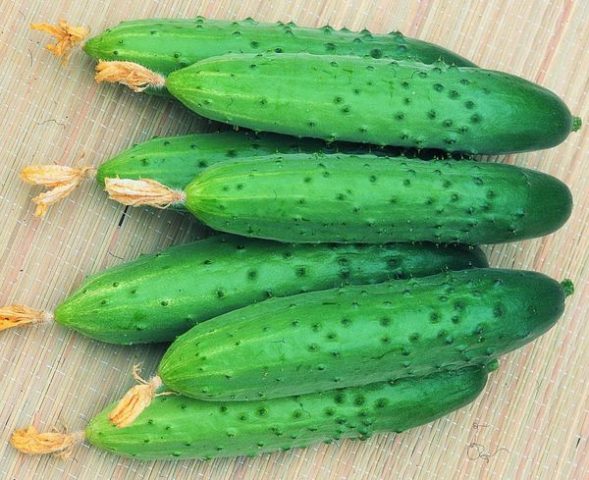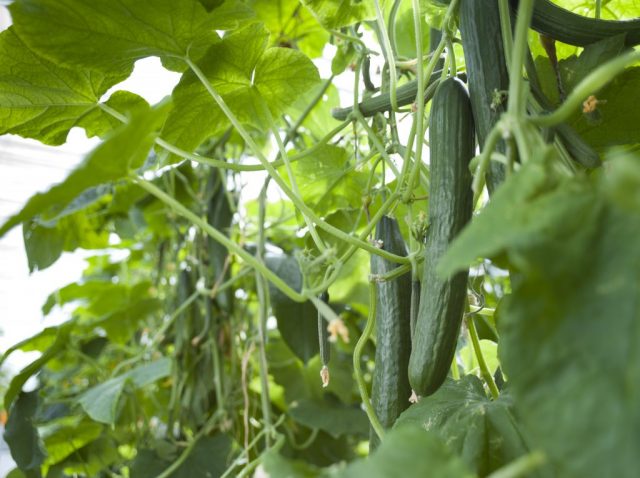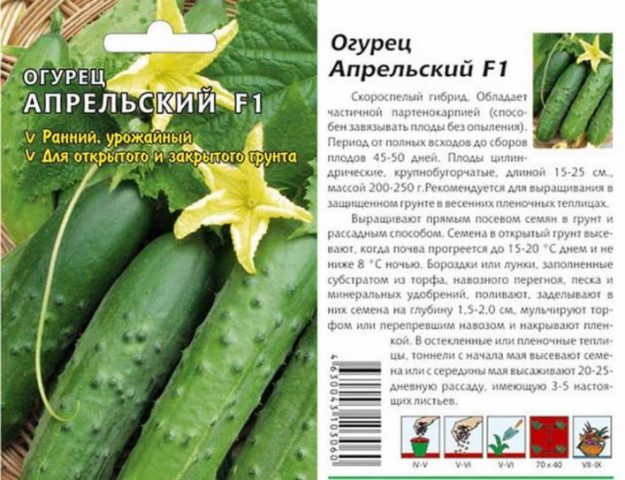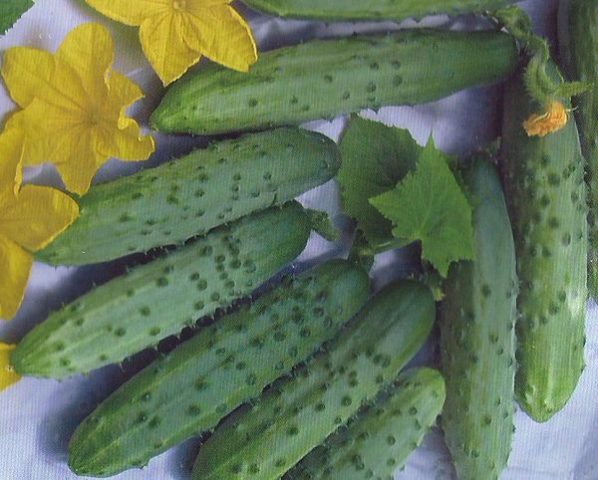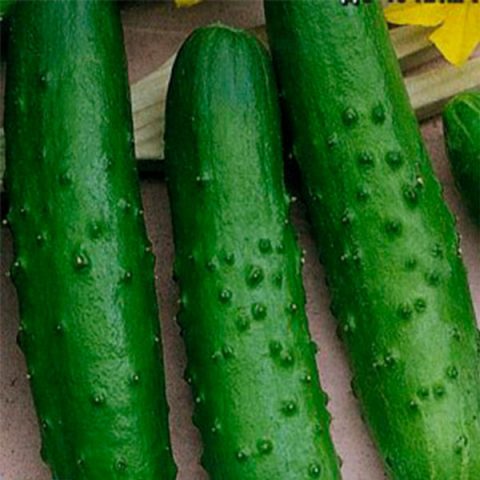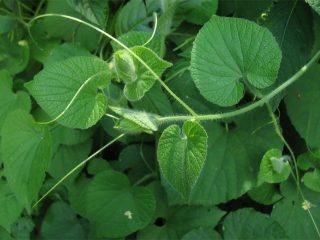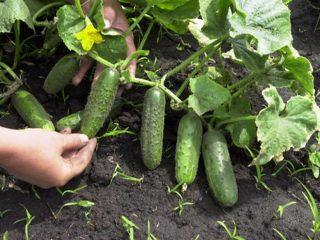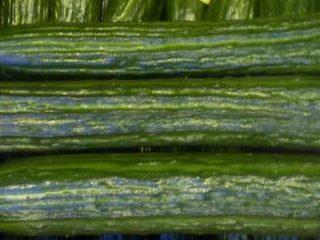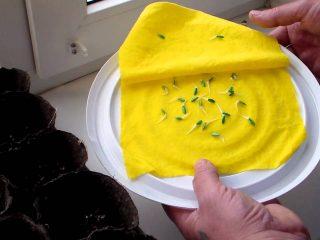Content
Cucumbers are the most common vegetables found in any garden. When choosing a variety, gardeners are guided by several parameters: yield, unpretentious care, disease resistance. The April cucumber has been tested for several decades, and therefore continues to be popular. But this variety also has its own secrets that you should know.
Detailed description of the variety
The main advantage of this variety is that it does not need insects for pollination. This allows you to successfully grow April cucumber in a greenhouse, as well as on a windowsill or even on a balcony. These cucumbers were bred in 1977 and since then have been one of the most popular and versatile varieties. This is a hybrid of the first generation, which has a central lash length of about 2 m. At the same time, the lateral lashes do not grow. Most of the flowers on the plant are female.
Description of fruits
The April cucumber variety is distinguished by its dark green fruits. Their length is 15-25 cm. The surface of the fruit is ribbed with light fluff. The shape of the cucumbers is cylindrical. This hybrid, together with the Zozulya variety, received the first place at the international exhibition in terms of taste.
A feature of April cucumbers is that when overripe they do not taste bitter and do not outgrow. Also, the variety is not prone to yellowing.
The weight of one fruit varies between 200-250 g.
Is it possible to preserve April cucumbers
April cucumber f1 is suitable for fresh consumption. It is mainly intended for salads, cold appetizers, soups. But it is quite possible to preserve cucumbers. The size allows pickling and pickling the whole fruit.
The main characteristics of the variety
Cucumbers of the April F1 variety, according to reviews, look like in the photo in a greenhouse, they do not belong to frost-resistant varieties. They love good light and warmth.
Cucumbers are resistant to most common diseases. At the same time, they are susceptible to damage by white rot. Ogorodnikov is pleased with the undemandingness of the hybrid to care and the soil in which the variety grows. It does not require frequent feeding, it is adapted for cultivation practically all over Russia.
Yield
April cucumbers are high-yielding varieties with early ripening. 1.5 months pass from the first shoots to the first harvest. At the same time, a feature of this hybrid is a friendly yield. These cucumbers are not enough for the whole season. It is advisable to plant another variety of later cucumbers.
Productivity from 1 sq. m is up to 24 kg. In the first 2-3 weeks of fruiting, yield from 1 m2 - 15-17 kg.
Pest and disease resistance
Apart from white rot, the rest of the April variety is resistant to disease. Pests also do not strongly affect this variety, if a competent crop rotation is used on the site and elementary preventive actions are carried out.
Pros and cons of the variety
Like other varieties of cucumbers, the April variety, according to the description and reviews, has a large number of advantages. But there are also disadvantages. This is important to consider when choosing cucumbers for planting.
Pros of the variety:
- self-pollination;
- early maturity;
- friendly and simultaneous fruiting;
- high resistance to disease;
- not capriciousness in leaving.
The disadvantages include:
- fruiting for a short period;
- predisposition to white rot.
But the advantages are much greater, so this hybrid successfully thrives on the beds and balconies of cucumber lovers.
Cultivation of April cucumbers
Subject to the peculiarities of agricultural technology, cucumbers will give a stable and large harvest. The April cucumber f1 is suitable for growing both by seeds and seedlings. The parthenocarpic properties that are inherent in this hybrid allow it to be grown absolutely without the participation of pollinating insects, but if insects still pollinate the cucumber, then on average, the yield increases by 25%.
Sowing dates
The timing of sowing cucumbers depends on what method they will be grown by: seedlings and not.
When planting seedlings, the optimal age of seedlings for transferring to open ground is 25 days, when 4-5 leaves are formed. Therefore, the sowing time depends on when it is necessary to plant seedlings in open ground. In the southern regions - early May, and in more northern regions - June.
As for the cultivation of cucumbers without seedlings, in this case, the sowing time depends on the conditions of agricultural technology. For the greenhouse, the sowing time is mid-April, and for open ground - the end of May.
Site selection and preparation of beds
For planting April cucumbers, it is necessary to select a site with loamy or sandy loam soils. It is better to choose a place for landing on the south side of the site, in a sunny place. This is a photophilous variety that will not be able to give a full harvest in the shade. In the fall, rotted manure, superphosphate, as well as potash fertilizers are applied to the area for cucumbers.
After fertilization, the area should be dug up. If the soil is characterized by high acidity, then from autumn dolomite flour, ash or lime is added to the site
Site preparation continues in the spring. The soil is fed with nitrogen fertilizers and added to the compost well just before sowing.
To comply with the basic rules of crop rotation, you should not plant cucumbers in the same place. The best predecessors will be potatoes, garlic, peas, beans, and beets.
How to plant correctly
Seeds of cucumbers should be planted to a depth of no more than 1.5 cm. It is not worth planting deeper than 2 cm, since it will be difficult for seedlings to break through. 1-2 seeds should be put into the prepared hole. After germination, planting should be discharged if they are frequent. The ideal distance between cucumbers is 30 cm. The distance between the rows is 50 cm. When thinning, it is important not to damage the root system of a nearby growing specimen. Better to cut off the ground.
When planting seedlings, it must be buried in pre-prepared holes. After thinning, it is recommended to treat the seedlings with a growth stimulant.
Follow-up care for cucumbers
To obtain the maximum yield, you will need to create optimal conditions. It is important to observe all the basics of agricultural technology and to produce correct watering, loosening, feeding and preventing diseases. April cucumber f1, according to descriptions and reviews, is unpretentious in care, but there are some nuances.
Watering is carried out depending on weather conditions. In the open field, April cucumbers do not need to be watered in the presence of regular rains. If there is little rainfall, then the plantings must be watered every 2 days. If there is no precipitation, watering is carried out every day.
Moreover, if the ambient temperature is above + 30 ° C, and there is no rain, then you need to water the cucumbers 2 times a day.
The water should be warm so that the root system does not undergo hypothermia.
It is recommended to loosen the soil after watering. It is better to do this regularly before the start of the cucumber flowering process.But weeding should be carried out constantly, as needed. Weeds can take up some of the nutrients and also spread disease.
For young plants, pinching is recommended only after the shoots have reached at least 6 cm in length.
To make it easier to care for the cucumbers, it is recommended to tie the plant up. There are several ways to tie:
- Horizontal - a strong twine is tied to wooden or metal supports. The method has a drawback - hanging shoots can create shadow to the rest of the plant.
- Vertical - the string is pulled vertically, and the cucumber is pulled upwards along it.
- Mesh - a special mesh is used.
Cucumbers respond positively to feeding. The first time you need to fertilize 2 weeks after sowing. Ammonium nitrate is introduced.
Top dressing with potash fertilizers is carried out during the formation of shoots. At the beginning of the fruiting period, organic matter or mineral fertilizers are applied.
The April cucumber is resistant to most diseases, but it must be protected from white rot.
Rot may appear due to excessive thickening of the planting. It is important to constantly ventilate the greenhouse so that the air does not stagnate.
To combat the white rot that has appeared, it is necessary to spray with special solutions according to the instructions.
Conclusion about April cucumbers
The April cucumber is a popular and unpretentious variety that is widely used by summer residents and gardeners. A distinctive feature of this species is the absence of the need for pollination. Its high taste is also noted. This variety belongs to the early and is used as a salad cucumber.
Testimonials
